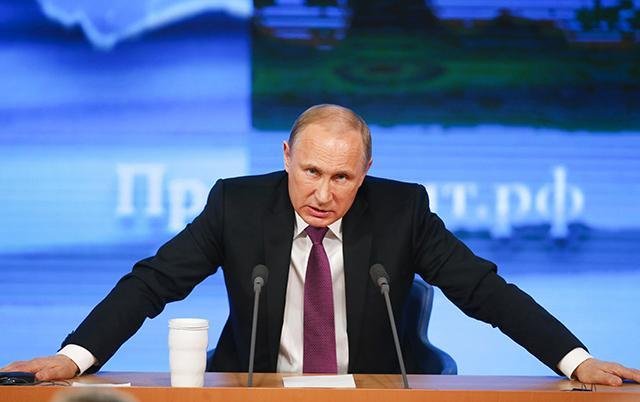'Putin's Revenge': 'Frontline' explores 'a lifetime of grievances' against the U.S.

Tonight (9 p.m., KTCA-Channel 2), the great PBS documentary series “Frontline” will premiere the first of a two-parter on the 2016 election (about which you may have already heard and read a fair bit) and especially about the role of Russian interference.
The second part will run a week from tonight. The Frontliners made a preview copy available to me, so this is a preview of Part 1, and I’ll put up a preview of Part 2 a little closer to the air date.
The whole two-parter is titled “Putin’s Revenge.” Part 2 is about Russian interference in our election. But most of Part 1 is devoted to the rise of Putin and the growth of the various grudges that may have led him to want to seek “revenge” by interfering in our election.
I should get this out of the way right quick. There’s little or nothing in either part to suggest active collaboration by candidate Donald Trump or his minions in the interference, except by exploiting some of the material that the Russians hacked from the Democrats last year and made public, with the assistance of Wikileaks.
Most of Part 1 is unrelated to the 2016 election and instead traces the sources of “a lifetime of grievances” Putin had developed against our dear nation that led him to want “revenge.” If you can summon an extremely high level of objectivity to see how real these “grievances” might seem to Putin, you can perhaps understand Putin’s motivations. I am certainly not a Putin admirer, and I’m not suggesting that you should sympathize with his grievances, but Part 1 offers a pretty good chance to see things through Putin’s eyes and to perhaps see how U.S. smugness and domination looks to those on the receiving end. Here goes:
Putin is a Russian nationalist/patriot. He came up through the KGB, which trained him to think of the United States as “the enemy” and rival of the Soviet Union in a struggle for global dominance. Over the course of Putin’s life, he has seen the Soviet Union fall apart and Russia’s standing as a leading world power dramatically reduced.
As a young KGB agent in Dresden, East Germany (when there was such a nation, which was part of the Soviet-dominated European Communist bloc), Putin was present for the fall the Berlin Wall, which was a stark symbol of growing U.S. power and waning Soviet/Russian influence.
George H.W. Bush, who was president at the time, called the fall of the wall “a victory for the moral force of our values.” For Putin, the film says, it was a “humiliation.” It was, of course, part of a long series of similar humiliations for Russian imperialism, as all of the Eastern Europe was similarly “liberated” (as an American would say) or lost to Russian control (as Putin might say).
Putin saw the decline continuing as Russia lost not only its “satellites” in Eastern Europe, but all of the so-called Soviet Socialist Republics that made up the Soviet Union. Through his eyes, these developments were all humiliations brought about by the interference of the United States, which he views as an imperial power constantly expanding the size of its empire and, during Putin’s life, doing so mostly by taking territory away from Russian control.
The film says that, to Putin, all of this shrinkage was the work of the United States. The constant increase in the U.S. sphere of influence tends to be called (by Americans) by the euphemism “regime change.” Putin fears Washington will not be satisfied until it brings “regime change” to Russia.
Back in Russia after the fall of the Berlin Wall, Putin remained in intelligence work and moved up through the ranks of the power structure until Russian President Boris Yeltsin made him prime minister. Then, after Yeltsin’s resignation in relative disgrace, Putin became president.
Still seeing the U.S. as aggressive and expansionist, Putin lost interest in a modus vivendi. Instead, the film says, Putin’s attitude to working with the United States becomes: “We’re giving up on you and we are going to make our own world in which we are the masters.”
When President Barack Obama, in a meeting with Yeltsin, says the United States wants to push a “reset button” and seek a better relationship, Yeltsin replies with a history lesson that heavily features the humiliation and damage Russia has suffered at the hands of U.S. imperialism.
According to “Putin’s Revenge,” when Putin watched what Americans call the “Arab Spring,” which brought about the overthrow of many Mideast governments in the early 2010s (including some that had been Soviet client states), he saw more U.S. expansionism at Russia’s expense.
When Putin saw Libyan leader Moammar Gadhafi being torn into pieces by an angry mob, he saw what would happen to himself if the Americans had their way, but (as the film’s narrator says) “Putin was determined that Gadhafi’s fate would not be his own.”
Putin won a third term as president in March of 2012, but the election fraud was so blatant that angry Putin opponents were in the streets chanting “Putin Must Go.” To Putin, this looked like U.S. influence, specifically that of Secretary of State Hillary Clinton, whom he neither likes nor trusts.
Julia Ioffe of The Atlantic, one of many journalists who give their views in the film, says, “What Putin sees is: Here’s American regime change, coming for him finally.” In particular, he focused on Hillary Clinton, who publicly criticized the way Putin’s re-election had been managed. Michael Crowley of Politico says that Putin “finds it incredibly provocative that Hillary Clinton feels the need to chime in at this moment of weakness, that it’s a kind of kick in the gut, that he never forgives.”
This, "Frontline" suggests, may have planted a seed that would turn a Russian campaign to undermine Clinton’s presidential campaign in 2016.
Nice post